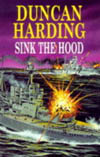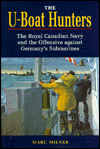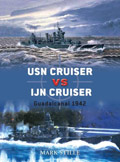Sink the Hood
Harding, Duncan
2000, Severn House Publishers, London
ISBN 0727855751
Hardcover, 219 pages
| Type. | Novel |
| Pros. | Solid slick use of fictional formula to create personal stories of famous events and writer’s point of view from today. |
| Cons. | Extremely poorly written, commercialised, hyperbolic contemporary ephemeral fiction. Grossly inaccurate portrayal of nations, vessels, events, and people involved, doing disservice to all involved. Worst kind of popular trash. |
| Rating. |  |
 Duncan Harding is a pseudonym of Charles Whiting, who also writes as Leo Kessler & John Kerrigan (Not Keegan). He has over 200 books in print and is one of the most borrowed authors in British Libraries, which is no justification of his style or content. This is the most recent, after the painfully similar Sink the Cossack, of a series of novels which purport to recreate famous naval events and battles via famous ships lost in them - Graf Spee, Bismarck, Ark Royal, et al. This new novel is the epitome of modern commercial war fiction: turgid mythic description of unlikely events, shallow, forgettable cardboard characters, with little evocation of period in detail, costume, language, dialogue or style. Sink the Hood especially plumbs new depths in portrayal of both Britain and Germany and their navies at war. The sailors are stiff, stereotypical outlines of real seamen, their officers broad washes of class-ridden English gents or rigid Prussian ubermensch, the opinions and attitudes either propagandist or even less subtle. Here even Hitler is featured, a short, flatulent pedagogue despised by his dog, staff and admirals Raeder and Lütjens. Such manipulative, poorly drawn characterisations are not needed to make us hate or fear the man. Everything has been enhanced, the action, the descriptions of men and their quirks and idiosyncrasies, the weather and motion. Nothing is natural, everything is forced, demanding the reader’s attention and feeling, and managing to attract neither.
Duncan Harding is a pseudonym of Charles Whiting, who also writes as Leo Kessler & John Kerrigan (Not Keegan). He has over 200 books in print and is one of the most borrowed authors in British Libraries, which is no justification of his style or content. This is the most recent, after the painfully similar Sink the Cossack, of a series of novels which purport to recreate famous naval events and battles via famous ships lost in them - Graf Spee, Bismarck, Ark Royal, et al. This new novel is the epitome of modern commercial war fiction: turgid mythic description of unlikely events, shallow, forgettable cardboard characters, with little evocation of period in detail, costume, language, dialogue or style. Sink the Hood especially plumbs new depths in portrayal of both Britain and Germany and their navies at war. The sailors are stiff, stereotypical outlines of real seamen, their officers broad washes of class-ridden English gents or rigid Prussian ubermensch, the opinions and attitudes either propagandist or even less subtle. Here even Hitler is featured, a short, flatulent pedagogue despised by his dog, staff and admirals Raeder and Lütjens. Such manipulative, poorly drawn characterisations are not needed to make us hate or fear the man. Everything has been enhanced, the action, the descriptions of men and their quirks and idiosyncrasies, the weather and motion. Nothing is natural, everything is forced, demanding the reader’s attention and feeling, and managing to attract neither.
If this is intended to take its readers back to the time, and involve them in things that actually happened, whether they are old enough to remember them or not, it is a striking failure. It neither carries any connection to the 1940s or the war particularly, nor a sense of what life was like in the navies concerned, or at sea. Everything is atypical and non-specific, it could be nearly any navy, in any period, apart from the vessels and uniforms used. The development and plot are formulaic, the events unlikely, the spy subplot injected entirely implausible. Harding attempts to use the recent allegation that Hood’s steel was substandard and that this was the key to her loss, which the discovery of her wreck in July 2001 entirely refutes. The modern asides by the writer, as he searches for sources and survivors, interspersed through the text, do reasonably indicate life in modern seaside boarding houses out of season, and some of the seedier types involved in publishing, but even this has little to do with historical recreation.
Characters have been changed and deformed, plot holes glossed over, errors of fact compounded, and not for artistic license. None of the events and men mentioned needed such treatment. They do not change the events or outcome at all. The modifications are entirely cavalier, on the author’s whim. You may say this does not matter, it is fiction. But the essence of historical fiction is recreating reality, taking the reader back into the place and time, getting details right. Even with a fair amount of artistic licence the tale should still ring true, be possible: - after all the events actually happened, these men did exist. There is no need for the short, slight Adm. Tovey to become tall and lanky, for the German leaders to all become bull-headed Prussian stiffs. There is no need for aircraft to be shot down, Danish ships attacked and sunk, crews butchered.
Better that Harding had tried to capture, as Ted Briggs did in Flagship Hood, the sense of how it was to be a young, inexperienced midshipman or seaman among thousands in a huge, labyrinthine, damp, dim warship, charging through gathering seas to her doom. Harding has done a disservice to the survivors and their relatives, to the memories of the time and the events, and to war fiction in general. He has not managed to get anything right, and in deliberately reworking and distorting the events, has neither created an interesting or exciting tale, nor revealed anything new, rich, or profound about the time, the men or their lives and deaths. This may not really be the role of such light war fiction, but evocation of period is hardly too much to ask.
The reviewer welcomes your comments on this review.
Review written by Ian Campbell, Launceston, Tasmania.
Published on 1 Jul 2002.
Purchase information: (info) Get Sink the Hood now at amazon.com
Get Sink the Hood now at amazon.com  Get Sink the Hood now at amazon.co.uk
Get Sink the Hood now at amazon.co.uk
Return to our main review page.



